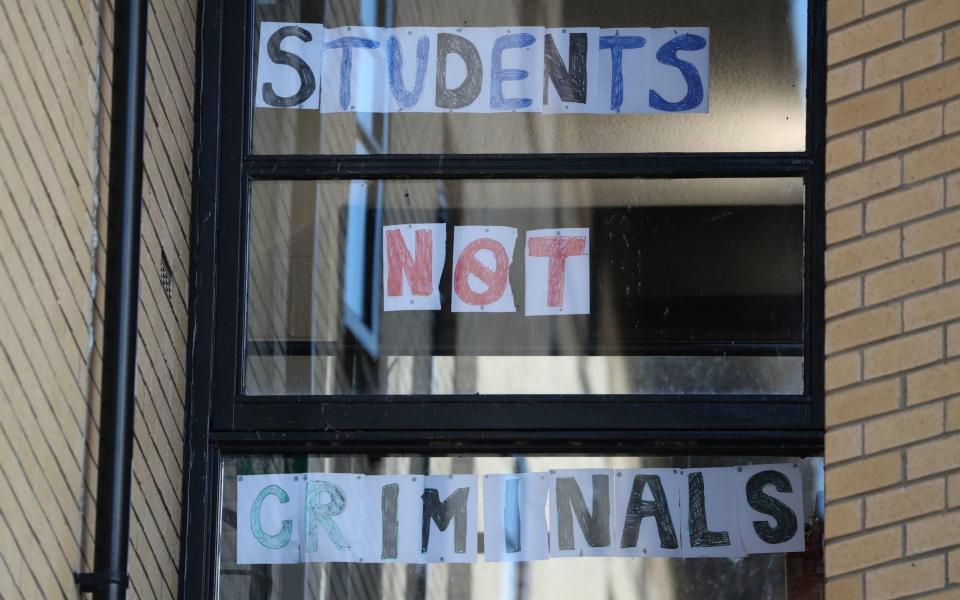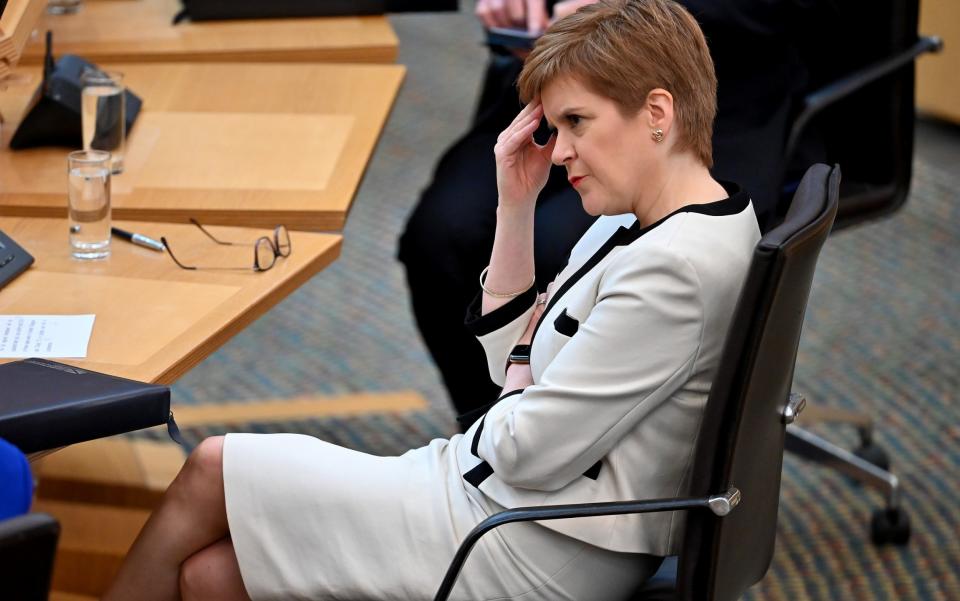Police report attacks 'panicked response' by SNP ministers and universities to student Covid outbreaks

Nicola Sturgeon's government and Scotland's universities have caused students needless "confusion and worry" thanks to their "seemingly panicked response" to Covid-19 outbreaks, the country's police watchdog will be told.
A report to the Scottish Police Authority (SPA) heavily criticised the authorities' reaction to hundreds of coronavirus cases in student halls of residence and shared accommodation.
Written by the SPA's Covid-19 advisory group, it said their talk of "'bans' and threats about students not being able to go home, now or potentially even at Christmas, have caused unnecessary worry for many."
The report also criticised "a blurring of the distinction between guidance, criminal law and university rules" and attacked the lack of clarity over what constituted a "household."
It said: "Government and universities should have been much clearer in communications, explanation and support for young people and their families as opposed to causing confusion and worry."
In an outspoken attack, the group concluded: "The situation of students demands support and understanding, not enforcement and threat. As before, only egregious or repeated breaches of regulations should see police intervention."
We’ve raised concerns on student COVID restrictions with @scotgov and @uni_scot. Read them now in our position statement: https://t.co/gkMAUsIiRX pic.twitter.com/oeyTn7bvXk
— Children and Young People's Commissioner Scotland (@CYPCS) September 29, 2020
The report was echoed by Scotland's children's commissioner, who attacked as confusing, inaccurate and "inconsistent" information published by Universities Scotland following a summit with SNP ministers.
Bruce Adamson said there was "no change in law" requiring students to stay away from bars last weekend and "no disciplinary or legal sanctions were, or could be, attached to a decision to comply."
Ms Sturgeon yesterday announced a further 806 Covid-19 cases, a new daily record although she said the total included a "high number of results" from samples taken on Friday and Saturday.
She said 11.6 per cent of tests had come back positive - more than double the World Health Organisation's five per cent threshold for the virus being under control.
Speaking at her daily briefing, she said: "The majority are in the under 40 age groups - with the bulk of those in the under 25 age group - and that is of course affected by university clusters we’ve been seeing in recent days."
Hundreds of students have tested positive for the virus as universities begin the new term, and more have been told to self-isolate in halls in conditions likened to a prison.
While members of the public face £30 fines in Scotland for breaking rules, students have been warned that if they are caught flouting restrictions they could be expelled.
Last night on BBC Reporting Scotland, national clinical director Jason Leitch was asked if students could go to family homes at weekends. Reply:"They can but we would ask them to maybe think hard about that. It's not going to be illegal. Nobody's going to put barriers up." Today: https://t.co/ScvfYawEyF
— Chris Musson (@ChrisMusson) September 24, 2020
Prof Jason Leitch, Scotland's national clinical director, said on Wednesday last week that students could go to their family home on weekends despite a nationwide ban on indoor visits to other households.
He performed an about-turn the following day when he tweeted "the law is clear: they can’t meet indoors with another household – even mum and dad."
However, SNP ministers published new guidelines on Sunday allowing them to return home permanently, to self-isolate or for unspecified "well-being" reasons.
Last week's Universities Scotland release, which included a quote from Higher Education Minister Richard Lochhead, said all students would be required to download the Protect Scotland contact tracing app to their phones.
This also warned that universities would take a "strict ‘Yellow Card/Red Card’ approach to breaches of student discipline", with penalties including "potential discontinuation of study."
But the following day Ms Sturgeon said the app would not be compulsory. She also assured students the request not to visit bars was for last weekend only, despite some universities warning the diktat could be extended.
The advisory group is headed by John Scott QC, a prominent human rights lawyer, who will present the report to Wednesday's SPA meeting for discussion.
While some "reassuring noises" have been made by the Scottish Government and universities, the report said "what has been allowed to happen is highly unsatisfactory as well as, to an extent, avoidable."
It said: "Clearer communications were needed, involving detailed information to allow informed decisions by students and their families before students went to student accommodation."
The report also noted that the "plight of students has evoked considerable sympathy from many although also antipathy from some."

In a separate statement published online, Mr Adamson said: "We have heard directly from young students left anxious and distressed by the recent confusion on restrictions and it is essential that Scottish Government and university principals communicate directly and accurately with students with a definitive position on the law, and any revised guidance."
The commissioner's office noted that the new regulations were not published until after they came into force last Friday and criticised the statements made by "the Scottish Government, Universities Scotland and individual universities."
The statement said these "resulted in students being given the impression that more legal restrictions applied to them than to other people, even though such additional restrictions had no basis in law."
A Universities Scotland spokesman said: "We have been in dialogue with both Police Scotland and the Scottish Children’s Commissioner and will continue to speak to them about their concerns. We accept that the extra measures we asked of students regarding last could have been a lot clearer. We sought to add clarity by providing additional information on Friday."
The damning criticism emerged as the principal of St Andrews University gave students permission to leave their halls of residence "whenever you want" without financial penalty on their accommodation contracts.
Prof Sally Mapstone said fewer than 25 students had asked to go home but around a thousand "are currently not with us in St Andrews, and are studying entirely remotely."

